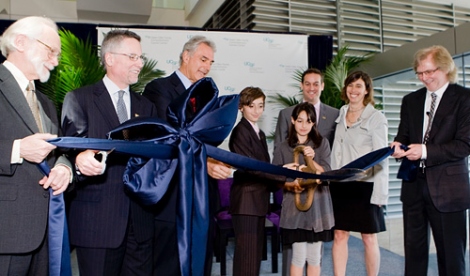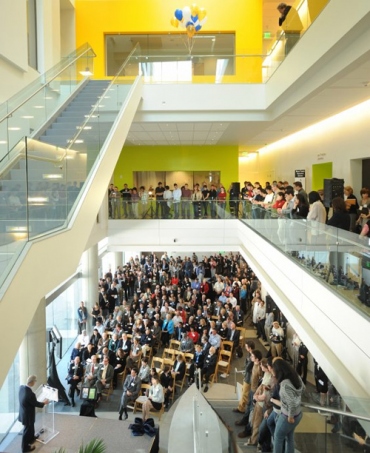Quest to Conquer Cancer Continues in New Research Building at Mission Bay

Hundreds turned out at UCSF Mission Bay on Tuesday for the opening of the Helen Diller Family Cancer Research Building, a $135 million facility where scientists are working to conquer cancer.
“This is a great moment for UCSF and for the City of San Francisco and above all else for cancer research and cancer patients,” said UCSF Chancellor Mike Bishop, MD.
Bishop, who will step down as chancellor this summer, marveled at the manifestation of UCSF Mission Bay, the largest academic development project in the United States and a magnet to a thriving life sciences and biotech sector in San Francisco.
Bishop noted that the cancer research building was but a gleam in the eye of a few when he took the helm of UCSF 11 years ago. Although told that there was no room at UCSF Mount Zion, where another cancer research building and clinics are clustered, and no money for the project, the vision of campus leaders and the generosity of supporters prevailed.
“Along came a small group of angels,” Bishop said, referring to Helen and Sanford Diller and their family, who were among the project’s 300 donors.
The Dillers’ daughter, Jackie Safier, said the family is “very excited about the building and the spirit of collaboration in which it was designed.” She joined her husband, Dan, and their children, Josh and Lauren, on stage for the ribbon cutting ceremony.
In a keynote address at Tuesday’s opening event, J. Craig Venter, PhD, who pioneered the Human Genome project, said the future of cancer research and treatment will be determined in places like the Helen Diller Family Cancer Research Building.
“It sounds like science fiction scenarios,” he said of some of the latest innovations in the field, “but it all has come from simple ideas in labs that turned into breakthroughs. Good environments have a huge impact on how science is conducted.”
The standing-room only audience for the afternoon address and panel discussion spilled onto the building’s balconies and main staircases, while others watched via live webcast or followed the day’s events on Twitter. Many toured the five-story research building, designed by award-winning architect Rafael Viñoly.
Frank McCormick, PhD, director of the Helen Diller Family Comprehensive Cancer Center, reflected on the occasion, saying that just a decade ago UCSF was applying for national designation; today it ranks sixth nationwide in National Cancer Institute research grants.
“The quest to conquer cancer will be even more possible given the proximity of the basic scientists with their colleagues in clinical care,” noted McCormick, referring to the effort to build a new medical center at Mission Bay.
Mitchel Berger, MD, who for 12 years has served as director of the Brain Tumor Research Center, described the occasion as the “Super Bowl of cancer centers.” He said the new building will allow brain cancer research to advance.
“We all share the dream that we can eradicate brain cancer in adults and children in our lifetime,” he said. “We’re going to get there.”
Simply put, Berger said, the opportunities for clinical translation of scientific discoveries are “absolutely enormous, certainly greater than I’ve ever seen in my professional life.”

Tuesday’s program included a panel discussion by four leaders on personalized medicine and 21st-century cancer research and care — areas in which UCSF has already shown strong leadership.
“UCSF is, I think, the best in the world for interdisciplinary work, and I think that’s how all of these problems will be solved,” said Brook Byers, senior partner at the venture capital firm Kleiner Perkins Caulfield and Byers, who participated in the panel.
Susan Desmond Hellmann, MD, PhD, UCSF’s chancellor-elect, agreed. “Collaboration is more important than any of us thought in this field,” said Desmond Hellmann, a cancer specialist who trained at the University before embarking on a successful biotech career that included her latest role as president of product development at Genentech.
“If you are serious about working on any of the complex cancers today, you have to collaborate,” she said.
The featured speakers weren’t the only ones who spoke eloquently about the new research building and what it will mean for the University and for the entire community.
Jeanne Robertson, an ardent supporter of UCSF, was among members of the community to gather for the opening celebration, which represents another milestone in the making of UCSF Mission Bay.
“I am very excited to see this tremendous growth that seems to be accelerating,” she said. “It is a wonderful endeavor for the people in the community and the University. The City is very proud of UCSF.
“From a personal standpoint, I love the place,” she added. “I know many of the doctors and the scientists and they are some of the most interesting and passionate people I know.”
Robertson said the new research building is the latest in a series of exciting developments that will culminate in the opening of the new UCSF Medical Center at Mission Bay in 2014, an integrated hospital complex that will include a specialty hospital devoted entirely to cancer patients.
“It’s thrilling to see this progress and when we get the new hospitals, there will be no place like [UCSF Mission Bay] in the nation and probably the world,” she said.
Photos by Noah Berger